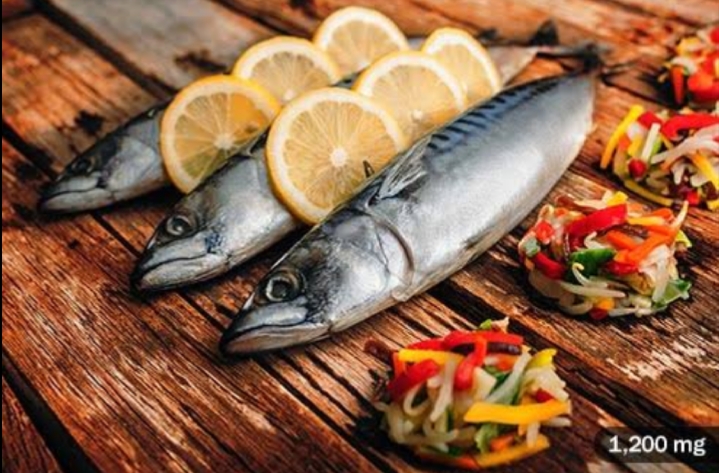13 most anti-inflammatory foods you can eat
Inflammation can be both good and bad.
On one hand, it helps protect your body from infection and injury. On the other hand, chronic inflammation can lead to weight gain and disease.
Stress, inflammatory foods and low activity levels may increase this risk further.
However, studies show that certain foods can fight inflammation.
There are 13 anti-inflammatory foods here.
1. Berries
Berries are small fruits that are full of fiber, vitamins and minerals.
Although dozens of varieties exist, some of which are the most common:
Strawberries
Blueberries
Raspberry
Body shot
Berries contain antioxidants called anthocyanins. These compounds have an anti-inflammatory effect that can reduce your risk of disease.
Your body produces natural killer cells (NK cells), which help your immune system to function properly.
In one study, men consuming blueberries every day produced significantly more NK cells than men who were not.
In another study, overweight adults ate strawberries, which were low levels of some inflammatory markers associated with heart disease.
Summary:Berries provide antioxidants known as anthocyanins. These compounds can reduce inflammation, enhance immunity, and reduce the risk of heart disease.
2. Fat Fish
Fatty fish protein and long chain omega-3 fatty acids are a great source of EPA and DHA.
Although all types of fish contain some omega-3 fatty acids, these fatty fish are among the best sources:
Salmon
Sardines
Hilsa
mackerel
anchovies
EPA and DHA reduce inflammation causing metabolic syndrome, heart disease, diabetes, and kidney disease.
Your body metabolizes these fatty acids into compounds called Resolvins and Protectons, which have anti-inflammatory effects.
In clinical studies, people taking salmon or EPA and DHA supplements experienced reductions in the inflammatory marker C-reactive protein (CRP).
However, in another study, people with an irregular heartbeat who took EPA and DHA daily found no difference in inflammatory markers, compared to those who received a placebo.
SUMMARY:Fatty fish contain high amounts of the omega-3 fatty acids EPA and DHA, which have anti-inflammatory effects.
3. Broccoli
Broccoli is very nutritious.
It is a cruciferous vegetable with cauliflower, Brussels sprouts, and bananas.
Research has shown that eating a lot of cross vegetables reduces the risk of heart disease and cancer.
This may be related to the anti-inflammatory effects of antioxidants that they contain.
Broccoli is rich in sulforaphane, an antioxidant that fights inflammation by lowering your levels of cytokines and NF-kB, which drives inflammation.
SUMMARY:Broccoli is one of the best sources of sulforaphane, an antioxidant with powerful anti-inflammatory effects.
4. Avocados
Avocados may be one of the few alleged superfoods worthy of the title.
They are full of potassium, magnesium, fiber and heart-healthy monounsaturated fat.
They also contain carotenoids and tocopherols, which are associated with lower cancer risk.
In addition, a compound in avocados can reduce inflammation in young skin cells.
In one study, when people ate a piece of avocado with hamburger, they had lower levels of the inflammatory markers NF-kB and IL-6 than participants who ate hamburgers alone.
SUMMARY:Avocados offers a variety of beneficial compounds that protect against inflammation and may reduce your cancer risk.
5. Green Tea
You've probably heard that green tea is one of the healthiest drinks you can drink.
It reduces your risk of heart disease, cancer, Alzheimer's disease, obesity and other conditions.
It has many benefits due to its antioxidant and anti-inflammatory properties, particularly a substance called epigallocatechin-3-gallate (EGCG).
EGCG inhibits inflammation by reducing pro-inflammatory cytokine production and damage to fatty acids in your cells.
You can buy green tea in most stores or online.
SUMMARY:Green tea reduces inflammation and protects your cells from damage which can lead to disease.
6. Chili
Bell peppers and chili peppers are loaded with vitamin C and antioxidants that have powerful anti-inflammatory effects.
Bell papers provide the antioxidant quercetin, which may reduce a marker of oxidative damage in people with sarcoidosis, an inflammatory disease.
Chili peppers contain sinapic acid and ferulic acid, which can reduce inflammation and lead to healthy aging.
SUMMARY:Chili peppers and bell peppers are rich in strong anti-inflammatory effects with quercetin, sinapic acid, ferulic acid, and other antioxidants.
7. Mushroom
While thousands of varieties of mushrooms exist worldwide, only a few are edible and are grown commercially.
These include truffle, portobello mushroom, and shitek.
Mushrooms are very low in calories and rich in selenium, copper and all of the B vitamins.
They also contain phenols and other antioxidants that provide anti-inflammatory protection.
A special type of mushroom called lion's mane can potentially reduce low-grade, obesity-related inflammation.
However, one study found that cooking mushrooms significantly reduced their anti-inflammatory compounds. Thus, it may be best to eat them raw or light.
SUMMARY:Some edible mushrooms increase compound compounds that can reduce inflammation. Eating them raw or lightly cooked can help you regain their full anti-inflammatory ability.
8. Grapes
Grapes contain anthocyanin, which reduces inflammation.
In addition, they can reduce the risk of many diseases including heart disease, diabetes, obesity, Alzheimer's and eye disorders.
The grape is also one of the best sources of resveratrol, another compound that has many health benefits.
In one study, people with heart disease who consumed grape extracts experienced a decrease in inflammatory gene markers, including NF-kB
What's more, their levels of adiponectin are increased. Low levels are associated with weight gain and increased risk of cancer.
SUMMARY:Several plant compounds in grapes, such as resveratrol, can reduce inflammation. They can also reduce your risk of many diseases.
9. Turmeric
Turmeric is a spice with a strong, earthy flavor that is often used in curries and other Indian dishes.
It has attracted a lot of attention for its content of curcumin, a powerful anti-inflammatory nutrient.
Turmeric reduces inflammation related to arthritis, diabetes and other diseases.
In fact, daily intake of 1 gram of curcumin from pepper along with piperine led to a significant decrease in the inflammatory marker CRP in people with metabolic syndrome.
However, it may be difficult to obtain sufficient curcumin to experience noticeable effects from turmeric alone.
In one study, overweight women consuming 2.8 grams of turmeric per day showed no improvement in inflammatory markers.
Taking isolated curcumin supplements is more effective. Curcumin supplements are often combined with piperine, which can increase curcumin absorption by 2,000%.
If you are interested in using turmeric in cooking, you can find it in most grocery stores or online.
SUMMARY: Turmeric contains a powerful anti-inflammatory compound called curcumin. Eating black pepper with turmeric greatly increases the absorption of curcumin.
10. Extra virgin olive oil
Extra virgin olive oil is one of the healthiest fats you can eat.
It is rich in monounsaturated fat and is a staple in the Mediterranean diet, providing many health benefits.
Studies add extra virgin olive oil to low risk of heart disease, brain cancer and other serious health conditions.
In a study on the Mediterranean diet, CRP and several other inflammatory markers were significantly reduced in those who consumed 1.7 ounces (50 mL) of daily olive oil.
The effects of the antioxidant oleocanthal found in olive oil have been compared to anti-inflammatory drugs such as ibuprofen.
Keep in mind that extra virgin olive oil offers more anti-inflammatory benefits than those provided by more refined olive oil.
It is easy to find extra virgin olive oil at your local grocery store, but you can also buy it online.
SUMMARY: Extra virgin olive oil provides powerful anti-inflammatory benefits, which can reduce your risk of heart disease, cancer and other serious health conditions.
11. Dark Chocolate and Cocoa
Dark chocolate is delicious, rich and satisfying.
It is also packed with antioxidants that reduce inflammation. These can reduce your risk of disease and lead to healthy aging.
Flavonols are responsible for chocolate's anti-inflammatory effects and contain endothelial cells that make your arteries healthy.
In one study, smokers experienced significant improvement in endothelial function within 2 hours of eating high-flavanol chocolate.
However, be sure to choose dark chocolate that contains at least 70% cocoa - a larger percentage is even better - to achieve anti-inflammatory benefits.
If you forgot to catch this treat on your previous run at the store, you can always buy it online.
SUMMARY: Flavanols in dark chocolate and cocoa may reduce inflammation. They can also reduce your risk of many diseases.
12. Tomatoes
Tomato is a nutritional power center.
Tomatoes are high in vitamin C, potassium, and lycopene, an antioxidant that has impressive anti-inflammatory properties.
Lycopene may be particularly beneficial for reducing anti-inflammatory compounds related to several types of cancer.
One study has determined that drinking tomato juice has decreased inflammatory markers in overweight women - but they are not obese.
Note that cooking tomatoes in olive oil can maximize the amount of lycopene you absorb.
This is because lycopene is a carotenoid, a nutrient that is better absorbed with a source of fat.
SUMMARY Tomato is an excellent source of lycopene, which can reduce inflammation and prevent cancer.
13. Cherry
Cherries are delicious and rich in antioxidants, such as anthocyanin and catechin, which fight inflammation.
Although the health promoting properties of tart cherries have been studied more than other varieties, sweet cherries also provide benefits.
In one study, when people consumed 280 grams of cherries per day for 1 month, the inflammatory marker CRP levels decreased and the cherries were reduced for 28 days by eating.
SUMMARY Sweet and tart cherries contain antioxidants that reduce the risk of inflammation and disease.
Bottom-line
Even low levels of inflammation on chronic basis can cause disease.
Do your best to maintain inflammation by selecting a variety of delicious, antioxidant-rich foods.
Black pepper, dark chocolate, fish and extra virgin olive oil are some of the foods that can help you fight inflammation and reduce your risk of disease.
Do you know some other method so tell in comment box?
















0 Comments